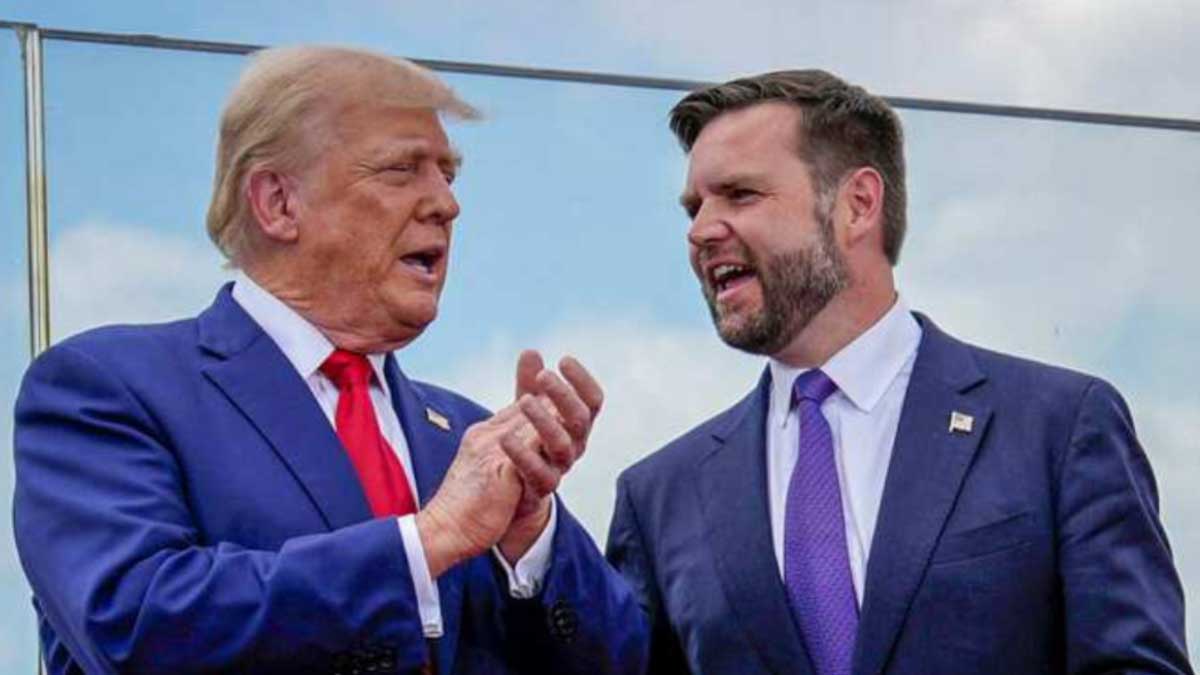- Home
- Billionaires
- Investing Newsletters
- 193CC 1000
- Article Layout 2
- Article Layout 3
- Article Layout 4
- Article Layout 5
- Article Layout 6
- Article Layout 7
- Article Layout 8
- Article Layout 9
- Article Layout 10
- Article Layout 11
- Article Layout 12
- Article Layout 13
- Article Layout 14
- Article Sidebar
- Post Format
- pages
- Archive Layouts
- Post Gallery
- Post Video Background
- Post Review
- Sponsored Post
- Leadership
- Business
- Money
- Small Business
- Innovation
- Shop
Recent Posts
Vance Asserts Trump Would Veto National Abortion Ban

On NBC’s “Meet The Press” this Sunday, Ohio Senator JD Vance, running mate of former President Donald Trump, made a notable declaration regarding Trump’s stance on abortion policy. Vance assured that Trump would veto any national abortion ban that might land on his desk if he were to return to the presidency. This statement comes amid ongoing debate about Trump’s views on abortion and the broader implications for national policy.
During the interview, Kristen Welker questioned Vance about whether he and Trump would commit to not imposing a federal ban on abortion if elected. Vance confidently affirmed, “I can absolutely commit that.” His comments reflect Trump’s growing inclination to leave abortion policy decisions to individual states rather than pursuing federal legislation. Vance explained that Trump is focused on addressing broader national issues, such as economic and immigration challenges, rather than engaging in the contentious abortion debate, which he believes should be handled at the state level.
When pressed further by Welker on whether Trump would indeed veto a federal abortion ban, Vance was unequivocal, stating, “I think he would. He’s said that explicitly that he would.” This stance aligns with Trump’s recent rhetoric, although he has previously expressed support for some form of national abortion regulations. As recently as March, Trump suggested he might endorse a federal ban on abortions after 15 weeks of pregnancy, indicating a nuanced position that stops short of a complete prohibition.
Vance’s comments underscore Trump’s desire to resolve the ongoing cultural conflict surrounding abortion by delegating decisions to the states. “Donald Trump’s view is that we want the individual states, and their individual cultures, and their unique political sensibilities to make these decisions because we don’t want to have a nonstop federal conflict over this issue,” Vance articulated on Sunday.
However, Trump’s position on abortion has evolved over time, contributing to the current debate. Historically, Trump’s views on abortion have shifted significantly. In 1999, he expressed a personal dislike for abortion but identified as “very pro-choice” during a “Meet the Press” interview. A decade later, in 2011, he publicly identified as “pro-life” while exploring a presidential run. His comments in 2016 suggesting that women seeking abortions should face punishment, which he later retracted, further illustrate his complex and often contradictory stance on the issue.
Trump’s past support for a 20-week abortion ban, which was passed in the House but did not advance in the Senate, highlights his involvement in the abortion debate during his presidency. Despite his presidency ending without a nationwide abortion ban, Trump’s positions on Planned Parenthood and funding further illustrate his evolving perspective. In 2015, he was ambivalent about Planned Parenthood funding, and by 2016, he stated he would cut federal funding, only to shift his stance on abortion funding issues over time.
In contrast, Vice President Kamala Harris and Democratic allies have utilized the issue of abortion as a significant point of contention against Republicans. During the Democratic National Convention, Harris criticized the GOP’s stance on abortion and expressed concern that Trump might support a national ban. Harris and other Democrats argue that Republicans, if they regain power, could impose restrictive measures on abortion at the federal level, a claim that contrasts with Trump’s current position of leaving abortion decisions to the states.
In recent developments, Vance has described himself as pro-life but aligns with Trump’s view that states should control abortion policies. Vance has previously indicated that he would support some form of national abortion standards, such as the 15-week ban Trump has mentioned, while still advocating for state-level decision-making. This stance reflects a compromise between national regulation and state autonomy.
Public opinion on abortion continues to be a critical factor in the ongoing political discourse. According to the Pew Research Center, 63% of Americans believe abortion should be legal in all or most cases. This view is particularly prevalent among Democrats and left-leaning independents, with 85% supporting legal abortion, compared to 41% of Republicans and right-leaning independents who share this belief. This demographic divide highlights the deep polarization surrounding abortion policy and its influence on political campaigns and debates.
As the 2024 presidential race progresses, abortion remains a pivotal issue, with Trump’s evolving stance and Vance’s commitments reflecting broader debates about federal versus state control. The discussion underscores the complexity of abortion policy in American politics and the significant impact it may have on the upcoming election.
Recent Posts
Categories
- 193 Countries Consortium Partner1
- 193cc Digital Assets2
- 5G1
- Aerospace & Defense48
- AI37
- Arts3
- Banking & Insurance11
- Big Data3
- Billionaires1,356
- Boats & Planes1
- Business332
- Careers13
- Cars & Bikes79
- CEO Network1
- CFO Network17
- CHRO Network1
- CIO Network1
- Cloud10
- CMO Network18
- Commercial Real Estate7
- Consultant1
- Consumer Tech194
- CxO1
- Cybersecurity73
- Dining1
- Diversity, Equity & Inclusion4
- Education7
- Energy8
- Enterprise Tech29
- Events11
- Fintech1
- Food & Drink2
- Franchises1
- Freelance1
- Future Of Work2
- Games149
- GIG1
- Healthcare79
- Hollywood & Entertainment203
- Houses1
- India’s 1000 Richest1
- Innovation46
- Investing2
- Investing Newsletters4
- Leadership65
- Lifestyle11
- Manufacturing1
- Markets20
- Media327
- Mobile phone1
- Money13
- Personal Finance2
- Policy569
- Real Estate1
- Research6
- Retail1
- Retirement1
- Small Business1
- SportsMoney42
- Style & Beauty1
- Success Income1
- Taxes2
- Travel10
- Uncategorized13
- Vices1
- Watches & Jewelry2
- world's billionaires1,325
- Worlds Richest Self-Made Women2
Related Articles
South Korea Plane Crash: A Tragic Loss and Global Mourning
The tragic plane crash at South Korea’s Muan International Airport on Sunday...
By 193cc Agency CouncilDecember 30, 2024H-1B Visa Debate Splits Trump Allies and Silicon Valley
The debate over H-1B visas has once again become a contentious issue,...
By 193cc Agency CouncilDecember 28, 2024Trump Moves $4B Stake in Truth Social Parent, Stock Drops 6%
Donald Trump recently transferred his 57% stake in Trump Media & Technology...
By 193cc Agency CouncilDecember 20, 2024House Rejects Trump-Backed Funding Bill, Shutdown Looms
The U.S. House of Representatives rejected a new government funding bill on...
By 193cc Agency CouncilDecember 20, 2024















Leave a comment